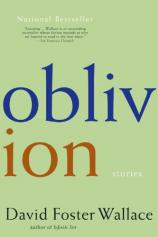Oblivion: Stories
Review
Oblivion: Stories
He's the POMO (postmodern literature) Diva! He's the king of long
sentences that make up plus-size novels. He's the Leslie Fiedler
for the X generation. He's David Foster Wallace and he's
POMOlicious, the "Wallacefriscizzlesizzle"!
And today's American culture of extremes and "reality" programming,
target hyper-marketing, "herd"-driven individualism, identity
theft, and the epidemic of minor medical disorders feature
prominently in the thematic backdrops of OBLIVION, Wallace's latest
collection of "short" stories, following 1999's BRIEF INTERVIEWS
WITH HIDEOUS MEN. Infamous for his mind-melting 1,079-page INFINITE
JEST (the "cement shoes" of contemporary novels), a fictional
biography (with no ending) of a tennis prodigy and a lost movie,
Wallace has made a literary career from the sardonic postmodern
form, employed most effectively by Thomas Pynchon (MASON &
DIXON).
For those unfamiliar with Pynchon and Wallace, authors who seem to
write when they are possibly "on acid" with the desire of making
the reader feel as if he or she is "on acid," it is best to start
with Wallace's BRIEF INTERVIEWS or Pynchon's THE CRYING OF LOT 49
as initiation to this artistic style and brand of humor. As humble
reviewer, I (the "reviewer," not the "on acid" reader) offer
"style" and "brand" in the singular form because, at times, it is
difficult to tell these two authors apart. Pynchon came first in
the age of Flower Power while Wallace continues the tradition
today. As in INFINITE JEST and his other works, Wallace, in
OBLIVION (a book for dedicated fans of the author --- "fans"
meaning readers who tolerate [or even "love"] sentences that go on
for pages, few paragraph breaks, excessive parenthesis and
quotation, lots of academic yet "hip" or snappy footnotes, and the
other scholarly techniques normally utilized in formal essay,
biography, and even in monograph forms), parodies an America so
overloaded with corporate marketing and political media spin that
the initial sales message of a brand of cola or allergy relief
medicine becomes a parody of itself before Wallace's parody makes
it to the bookshelves, like the Disney corporation banning a movie
it sponsored and produced.
The story that gives Wallace's latest collection its name concerns
Randall, an over-stressed corporate drone with a snoring problem.
The snoring is the "tip of the iceberg" one might say, as Randall
is shocked out of sleep, mid-snore, each night by wife Hope, who
cannot sleep because of Randall's snoring. Shaken from
"fourth-stage" sleep by Hope, Randall is left to lay awake for
several hours by Hope's protests because he believes that she is
not being woken by his possibly fictional snoring. Instead, Randall
feels that Hope is having "night terrors" associated with "empty
nest syndrome" as a result of her daughter, Audrey, leaving home
for college, out-of-state. Wallace delightfully explores the
mother-daughter jealousy brought on by age in the deteriorating
Hope and the budding, nubile Audrey, for whom Randall lusts (she is
his stepdaughter, not his biological daughter). Yet Randall is
plagued by his own lust for the daughter because he fears (and sees
in stress-related hallucinations) that Hope herself might have once
been (in her younger years) the target of her own stepfather's
misdirected affections.
The snoring solution? Randall and Hope seek the counseling of the
experts at a sleep clinic, as Wallace pokes fun at the variety of
imagined medical disorders that plague the American (Americans are
even better these days at "complaining" than our brothers to the
north, the Canadians) psyche --- peanut allergies, insomnia,
depression, anxiety, attention deficit disorder, dizziness,
migraine headaches, acid reflux disease, etc. --- and a greedy
medical community that rushes to find answers to these "disorders"
while the more critical cancer and AIDS go uncured.
In OBLIVION's "Mister Squishy," Wallace lampoons corporate
marketing, advertising, focus groups, extreme workouts and dieting
as a Chicago ad firm ponders the sale of a chocoholic snack dubbed
"Felonies!" The oddest and most un-Wallace story in the collection
is "The Soul is Not a Smithy," concerning a boy's comic book
daydreaming and substitute teacher's mental breakdown in an
elementary school. The story is too violently reminiscent of
Stephen King's early, immature and overwritten "Rage" from the
BACHMAN BOOKS.
But OBLIVION is signature "Wallace" and will delight Pynchonites
and Wallaceheads everywhere with this satiric brand of storytelling
that, in setting the reader up with an interesting, everyday plot
and offering no resolution or ending proper
Reviewed by Brandon M. Stickney on January 13, 2011
Oblivion: Stories
- Publication Date: August 30, 2005
- Genres: Fiction
- Paperback: 336 pages
- Publisher: Back Bay Books
- ISBN-10: 0316010766
- ISBN-13: 9780316010764





